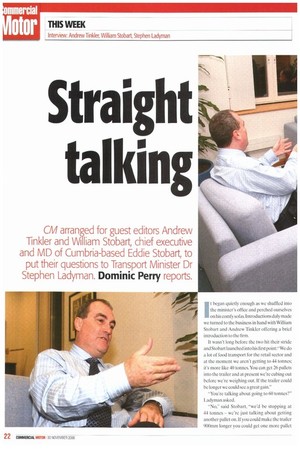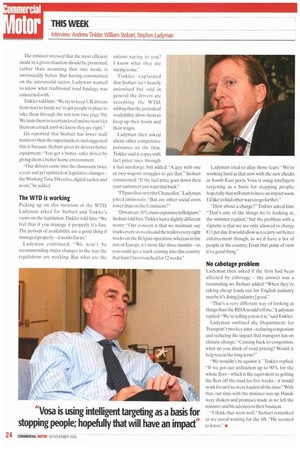Straight er‘
Page 22

Page 23

Page 24

If you've noticed an error in this article please click here to report it so we can fix it.
talking
CM arranged for guest editors Andrew
-inkier and Wiliam Stobart, chief executive
and MD of Cumbria-based Eddie Stobart, to put their questions to Transport Minister Dr Stephen Ladyman. Dominic Perry reports.
It began quietly enough as we shuffled into the minister's office and perched ourselves on his comfy sofas. Introductions duly made we turned to the business in hand with William Stobart and Andrew Tinkler offering a brief introduction to the firm.
It wasn't long before the two hit their stride and Stobart launched into his first point:"We do a lot of food transport for the retail sector and at the moment we aren't getting to 44 tonnes; 1 it's more like 40 tonnes. You can get 26 pallets into the trailer and at present we're cubing out before we're weighing out. If the trailer could be longer we could see a great gain."
-You're talking about going to 60 tonnes?" I Adyman asked.
"No," said Stobart, "we'd be stopping at 44 tonnes — we're just talking about getting another pallet on. If you could make the trailer 900rnm longer you could get one more pallet on. Plus with a steering axle on the back of the trailer you could keep within its current turning circle. It's a quick and easy fix that would allow you to take 7-8% of trucks off the road."
Ladyman doubted how fast such a change could be brought in: "You say it's a quick and easy fix but we'd have to convince the [European] Commission to change it across the whole of Europe." At this point he turned to his advisers and asked for confirmation that it would have to go back to the El I. They confirmed that it would.
No to 60 tonnes I lowever, he didn't totally dismiss the idea: "I'm perfectly prepared to look at it, but if we have to go back to the Commission then it's not going to be quick. I've had lots of representations about 60 tonnes but I had to resist those-we couldn't find a way of keeping them off roads that weren't suitable. However an idea like this is something I'm perfectly prepared to look at."
Eddie Stobart is keen to eradicate empty running, and Tinkler told the minister that the company works hard with its customers to reduce dead miles: "We look to see if we can load out of somewhere we've just tipped, for instance."
He added that the firm has just flitted Isotrak across its fleet (see page 54) this warns Stobart's traffic office if any of its vehicles are covering more than 70 miles empty. "Our customers are really buying into this and it's cutting non-productive time," Tinkler added. "It isn't just about loading a truck and getting it to a job: it's where the next load comes from that's important.
Talk turned to Stobart's contract with Tesco, which entails moving goods from Daventry Lo Scotland by rail. Tinkler asked if some could be done about the current allocati freight slots on the railways too man acquired and then not used, he explainec there are no financial penalties for doing t Ladyman offered no promises,but added desperately need to find more opport unit do this with different companies."
The aviation question Tinkler then drew attention to the f purchase of Carlisle airport and a for Ladyman's views on regional airi and aviation.
Ladyman gave a considered answer: aren't prescriptive about these things efficient and competitive we are willii help. The general issue about aviatil that it's a concern from the point of vic climate change."
The minister stressed that the most efficient mode in a given situation should be promoted, rather than assuming that one mode is intrinsically better. But having commented on the intermodal sector. Ladyman wanted to know what traditional road haulage was concerned with.
Tink ler told him: "We try to keep UK drivers from start to finish: we've got people in place to take them through the test now (see page 50). We train them to a certain level and we won't let them on a truck until we know they are right."
He reported that Stobart has lower staff turnover than the supermarkets and suggested this is because Stobart gives its drivers better equipment: "You get a better, safer driver by giving them a better home environment.
"Our drivers come into the classroom twice a year and get updated on legislative changes the Working Time Directive. digital tachos and so on." he added.
The WTD is working
Picking up on this mention of the WTD. Ladyman asked for Stobart and Tinkler's views on the legislation. Tinkler told him: "We feel that if you manage it properly it's fine. The periods of availability are a good thing if managed properly-it works for us."
Ladyman continued: "We won't he recommending major changes to the way the regulations are working. But what are the unions saying to you? I know what they are saying to me."
Tinkler explained that Stobart isn't heavily unionised but said in general the drivers are accepting the WTD, adding that the periods of availability allow them to keep up their hours and their wages.
Ladyman then asked about other competitive pressures on the firm. Tinkler said it copes with fuel price rises through a fuel surcharge. but added: "A guy with one or two wagons struggles to get that." Stobart commented: "If the fuel price goes down then your customers just want that back."
"I'll pass that on tothe Chancellor," Ladyman joked ominously. -But are other social costs lower than on the Continent?"
-Drivers are 30% more expensive in Belgium," Stobart told him.Tinkler had a slightly different worry: "Our concern is that we maintain our trucks every six weeks and the trailersevery eight weeks on the Belgian operation, whereas in the rest of Europe it's more like three months so you could get a truck coming into this country that hasn't been touched for 12 weeks." Ladyman tried to allay those fears: -We're working hard at that now with the new checks at South-East ports. Vosa is using intelligent targeting as a basis for stopping people: hopefully that will start to have an impact soon. I'd like to find other ways to go further."
"How about a charge?" Tinkler asked him. "That's one of the things we're looking at, the minister replied, "but the problem with a vignette is that we are only allowed to charge El 1 per day. It would allow us to carry out better enforcement though, as we'd have a list of people in the country. From that point of view it's a good thing."
No cabotage problem
Ladyman then asked if the firm had been affected by cabotage the answer was a resounding no. Stobart added: "When they're taking cheap loads out for English industry maybe it's doing [industry] good."
-That's a very different way of looking at things than the RHA would tell me," Ladyman replied."We're telling you as it is." saidTinkler.
Ladyman outlined the Department for Transport's two key aims-reducing congestion and reducing the impact that transport has on climate change: "Coming back to congestion, what do you think of road pricing? Would it help you in the long term?"
"We wouldn't be against it." Tinkler replied. "If we got our utilisation up to 90% for the whole fleet which is the equivalent to getting the fleet off the road for five weeks it would work for us if we were loaded all the time." With that, our time with the minister was up. Hands were shaken and promises made as we left the minister and his advisers to their business.
"I think that went well," Stobart remarked as we stood waiting for the lift. "He seemed to listen." •


















































































































































































